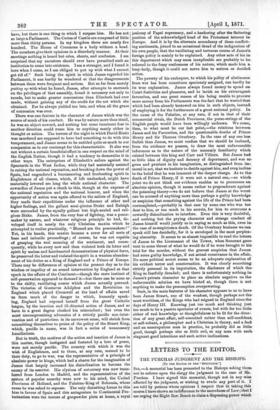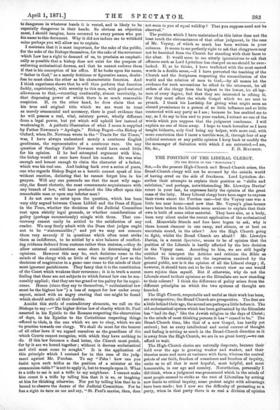LETTERS TO THE EDITOR.
THE PURCHAS JUDGMENT AND THE BISHOPSi
[TO THE EDITOB, OF THE " SPEOTATOR:l
Sin,—A memorial has been presented to the Bishops asking therm not to enforce upon the clergy the judgment in the case of Mr. Purchas. I have signed this memorial, though not in any wise affected by the judgment, or wishing to evade any part of it. I am told by persons whose opinions I respect that in taking this course I have shown an indifference to the sacredness of Law that I am urging the Right Rev. Bench to claim a dispensing power which is dangerous in whatever hands it is vested, and is likely to be -especially dangerous in their hands. So obvious an objection must, I should imagine, have occurred to every person who put his name to this document. Why it did not induce me to withhold mine perhaps you will allow me to explain.
I maintain that it is most important, for the sake of the public, sfor the sake of the Bishops themselves, for the sake of the reverence which Law has a right to demand of us, to proclaim as emphati- .cally as possible that a bishop does not exist for the purpose of enforcing ecclesiastical decrees, and that he cannot enforce them if that is his conception of his office. If he looks upon his name, 4' father in God," as a merely fictitious or figurative name, doubt- Jess he must claim the other as his characteristic function. And I think experience shows that he will then perform that function feebly, capriciously, with severity to this man, with good-natured -allowances to that,—resorting continually, almost inevitably, to 'that dispensing power of which there is BO much reasonable
-suspicion. If, on the other hand, he does claim that as his true and original title which we are wont to treat as merely ornamental and accessory, there is good evidence that he will possess a real, vital, salutary power, wholly different from a legal power, but yet which will uphold law instead of weakening it. A pathetic illustration of what I mean is supplied 'by Father Newman's "Apologia." Bishop Bagot—the Bishop of -Oxford, when Dr. Newman wrote in the "Tracts for the Times," was, I have always understood merely a courteous English gentleman, the representative of a courteous race. On any question of theology Father Newman would have cared little for his opinion. If he had attempted argument with him, the bishop would at once have found his master. He was wise -enough and honest enough to claim the character of a father, which was his real one. And looking back over a series of years, -one who regards Bishop Bagot as a heretic cannot speak of him without emotion, declaring that he cannot forget him in his .prayers. Will any one persuade me that the most wily saga- -.city, the finest rhetoric, the most consummate acquaintance with -any branch of law, will have produced the like effect upon this 'remarkable man or upon any inferior man?
I do not care to enter upon the question, which has been 'very ably argued between Canon Liddell and the Dean of Ripon in the Times, whether the decisions of the Judicial Committee zest upon strictly legal grounds, or whether considerations of ,policy (perhaps unconsciously) mingle with them. That con- rtroversy cannot easily be settled to the satisfaction of any -reader. We may freely admit with the Dean that judges ought snot to be "statesmanlike ;" and yet we may not censure 'them very severely if in questions which often must strike -them as indifferent, to be settled by a nice balance of conflict- ing evidence deduced from customs rather than statutes,—they do allow external considerations some share in determining their
• opinions. However this may be, such decisions come to the -minds of the clergy with as little of the sanctity of Law as the decisions of magistrates in a game case come to the minds of their most ignorant parishioners. They fancy that it is the constitution -of the Court which weakens their reverence ; it is in truth a secret -feeling that these are not subjects to which formal law can be rea- sonably applied ; that they are too grand or too paltry for its cogni- zance. Hence (since they say to themselves, " ecclesiastical law -must be the highest law ") a loss of respect for law under every -aspect, mixed with an angry craving that one might be found -which should settle all their doubts.
Amidst this strife of contradictory elements, we call on the -Bishops to say:—" The higher divine law of charity which St. Paul -asserted in his Epistle to the Romans respecting the observation -of days, in his Epistles to the Corinthians respecting things .offered to idols, is the one which we are to obey, which we are ,to practise towards our clergy. We shall do most for the honour -of all other laws if we regard ourselves as the guardians of this which Courts cannot recognize, with which they have nothing to -do. If this law becomes a dead letter, the Church must perish, for by it are we bound together ; without it decrees ecclesiastical and civil must come to nought." It is the application of this principle which I contend for in this case of the judg- ment against Mr. Parches. To say " Paha ! how can you insist upon such trifles as the position of a minister at the -communion-table ?" is not to apply it, but to trample upon it. What is a trifle to me is not a trifle to my neighbour. I cannot make him count it a trifle by telling him that it is so, or laughing at him for thinking otherwise. Nor yet by telling him that he is bound to observe the decree of the Judicial Committee. For he has a right to turn on me and say, "St. Paul's maxim, then, does
not seem to you of equal validity? That you suppose need not be observed."
The position which I have maintained in this letter does not the least touch the circumstances of that other judgment, in the case of Mr. Voysey, of which so much has been written in your columns. It seems to me perfectly right to ask that clergymen may not be banished from the Church for standing with their faces to the altar. It would seem to me utterly ignominious to ask that offences such as Lord Lyttelton has charged on me should be over- looked. If, as he thinks, I have trafficked with the most sacred words in a double sense,—if I have perverted the teaching of the Church and the Scriptures respecting the reconciliation of the world and the relation of men to God,—by all means let the evidence for such accusations be sifted to the uttermost, let all orders of the clergy from the highest to the lowest, let all lay- men of every degree, feel that they are interested in sifting it. For they must affect the whole Gospel which we are sent to preach. I thank his Lordship for giving what might seem an absurd prominence to a person of so little influence and so little connected with any party as I am ; because he has enabled me to say, as I do say to him and to your readers, I retract no one of the words which you suppose that the judgment condemns. I will explain no one of them away. I hope to teach hereafter as I have taught hitherto, only God being my helper, with more zeal, with more conviction that I incur a terrible woe, if, through fear of any judicial sentence or any public opinion I keep back or modify the the messenger of Salvation with which I am entrusted.—I am,

































 Previous page
Previous page